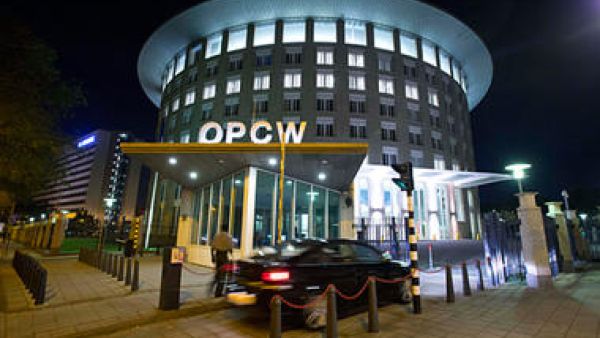UN leader Ban Ki-moon praised the decision to award this year's Nobel Peace Prize Organization for the Prohibition of Chemical Weapons (OPCW) Friday, citing the award as evidence of the "everlasting threat from the banned arms," according to an AFP report.
Ban Ki-moon cited the Syria case as evidence of chemical weapons remaining a "clear and present danger" to the international community and that OPCW's receipt of the award should coincide with renewed efforts to urge all countries to sign the Chemical Weapons Convention.
According to Ban Ki-moon praised OPCW's role "in strengthening the rule of law in the field of disarmament and non-proliferation" and said the chemical watchdog has "a broad mission to prove that the inhumanity of war can give rise to the humanity of solidarity and international cooperation." OPCW, who is responsible for overseeing the destruction of Syria's chemical weapon arsenal under the US-Russia brokered deal by mid-2014, was notified of its win early Friday by the Norway-based Nobel committee.
Ban Ki-moon was not the only party commenting and lauding OPCW Friday. Syrian lawmakers noted that OPCW's recognition "underscores the [Syrian government's] credibility" and is proof that Syria was setting "a [good] example to countries that have chemical and nuclear weapons," according to an Associated Press Report. Syria has complied so far with OPCW efforts to eliminate all chemical weapon arsenals in the country ahead of the mid-2014 deadline, but evidence is still mixed on what groups, whether pro-regime or rebel forces, were responsible for the chemical attacks in late August that triggered OPCW's inspections in Syria in the first place.
OPCW's win may therefore be used as a political tool by Syrian government officials to eschew attention from renewed regime-led violence throughout the country, related human rights violations, and its unwillingness to sign the Chemical Weapons Convention. Western powers may also use the announcement for political positioning purposes, particularly as a way to tout their credibility as nonviolent negotiators, despite earlier- and in the case of the US, lingering calls-to use military intervention in Syria. Finally, questions remain as to whether OPCW's receipt of the Nobel prize will be used by UN and Western powers to confine the international community's attention on Syria to solely solving the chemical weapon issue, rather than pursuing efforts for peace in the conflict-torn country more broadly.








